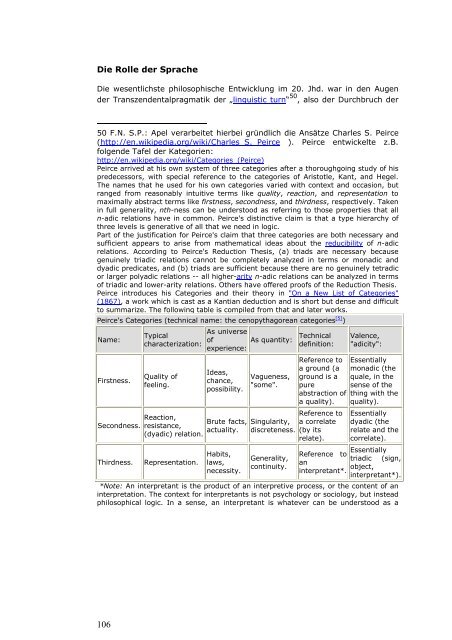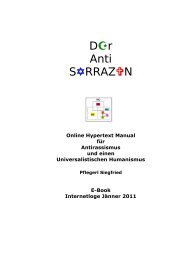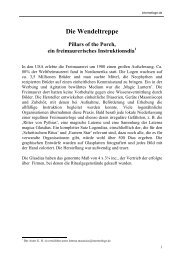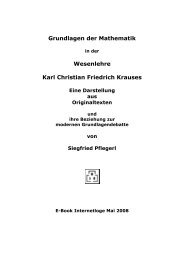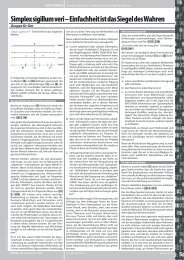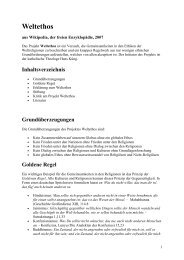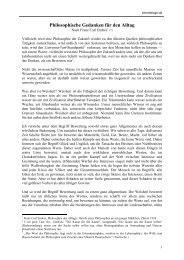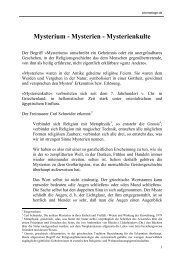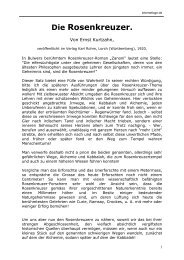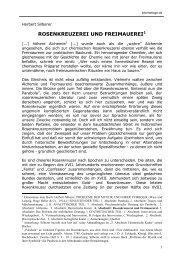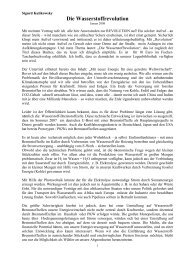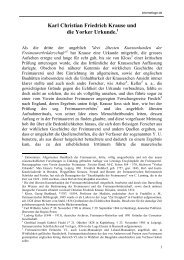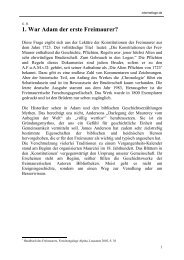Download gesamtes Buch: 206 S., PDF-File 4552 MB - Internetloge.de
Download gesamtes Buch: 206 S., PDF-File 4552 MB - Internetloge.de
Download gesamtes Buch: 206 S., PDF-File 4552 MB - Internetloge.de
Erfolgreiche ePaper selbst erstellen
Machen Sie aus Ihren PDF Publikationen ein blätterbares Flipbook mit unserer einzigartigen Google optimierten e-Paper Software.
Die Rolle <strong>de</strong>r Sprache<br />
Die wesentlichste philosophische Entwicklung im 20. Jhd. war in <strong>de</strong>n Augen<br />
<strong>de</strong>r Transzen<strong>de</strong>ntalpragmatik <strong>de</strong>r „linguistic turn“ 50 , also <strong>de</strong>r Durchbruch <strong>de</strong>r<br />
50 F.N. S.P.: Apel verarbeitet hierbei gründlich die Ansätze Charles S. Peirce<br />
(http://en.wikipedia.org/wiki/Charles_S._Peirce ). Peirce entwickelte z.B.<br />
folgen<strong>de</strong> Tafel <strong>de</strong>r Kategorien:<br />
http://en.wikipedia.org/wiki/Categories_(Peirce)<br />
Peirce arrived at his own system of three categories after a thoroughgoing study of his<br />
pre<strong>de</strong>cessors, with special reference to the categories of Aristotle, Kant, and Hegel.<br />
The names that he used for his own categories varied with context and occasion, but<br />
ranged from reasonably intuitive terms like quality, reaction, and representation to<br />
maximally abstract terms like firstness, secondness, and thirdness, respectively. Taken<br />
in full generality, nth-ness can be un<strong>de</strong>rstood as referring to those properties that all<br />
n-adic relations have in common. Peirce's distinctive claim is that a type hierarchy of<br />
three levels is generative of all that we need in logic.<br />
Part of the justification for Peirce's claim that three categories are both necessary and<br />
sufficient appears to arise from mathematical i<strong>de</strong>as about the reducibility of n-adic<br />
relations. According to Peirce's Reduction Thesis, (a) triads are necessary because<br />
genuinely triadic relations cannot be completely analyzed in terms or monadic and<br />
dyadic predicates, and (b) triads are sufficient because there are no genuinely tetradic<br />
or larger polyadic relations -- all higher-arity n-adic relations can be analyzed in terms<br />
of triadic and lower-arity relations. Others have offered proofs of the Reduction Thesis.<br />
Peirce introduces his Categories and their theory in "On a New List of Categories"<br />
(1867), a work which is cast as a Kantian <strong>de</strong>duction and is short but <strong>de</strong>nse and difficult<br />
to summarize. The following table is compiled from that and later works.<br />
Peirce's Categories (technical name: the cenopythagorean categories [5] )<br />
Name:<br />
Firstness.<br />
Secondness.<br />
Thirdness.<br />
Typical<br />
characterization:<br />
Quality of<br />
feeling.<br />
As universe<br />
of<br />
experience:<br />
I<strong>de</strong>as,<br />
chance,<br />
possibility.<br />
As quantity: Technical<br />
<strong>de</strong>finition:<br />
Vagueness,<br />
"some".<br />
Reaction,<br />
Brute facts, Singularity,<br />
resistance,<br />
actuality. discreteness.<br />
(dyadic) relation.<br />
Representation.<br />
Habits,<br />
laws,<br />
necessity.<br />
Generality,<br />
continuity.<br />
Reference to<br />
a ground (a<br />
ground is a<br />
pure<br />
abstraction of<br />
a quality).<br />
Reference to<br />
a correlate<br />
(by its<br />
relate).<br />
Reference to<br />
an<br />
interpretant*.<br />
Valence,<br />
"adicity":<br />
Essentially<br />
monadic (the<br />
quale, in the<br />
sense of the<br />
thing with the<br />
quality).<br />
Essentially<br />
dyadic (the<br />
relate and the<br />
correlate).<br />
Essentially<br />
triadic (sign,<br />
object,<br />
interpretant*).<br />
*Note: An interpretant is the product of an interpretive process, or the content of an<br />
interpretation. The context for interpretants is not psychology or sociology, but instead<br />
philosophical logic. In a sense, an interpretant is whatever can be un<strong>de</strong>rstood as a<br />
106


